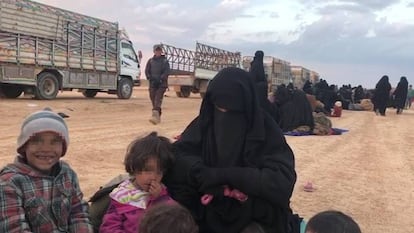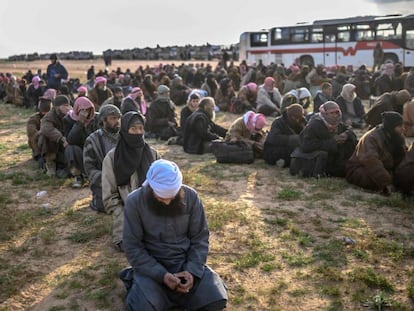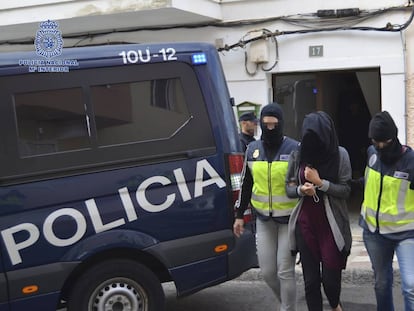The Jihadist women whom Spain wants to bring back home
Three female Spanish nationals have been identified in detention camps where members of the Islamic State in Syria are being held


Three Spanish women have been identified at detention camps for Jihadist combatants run by Kurdish militias in Syria following the fall of the Islamic State. According to police sources, one is a native of Morocco with Spanish citizenship, and the other two are Madrid-born women who converted to Islam. All three traveled to Syria with their husbands, and the Spanish government is now ¡°studying¡± whether to repatriate them and any minors in their care.
The last time that Lubna Miludi was seen in Spain was in April 2014, five months after Abu Bakr al-Baghdadi proclaimed the Islamic State on June 4?of that year. She was 21, and there is footage from security cameras at M¨¢laga airport showing her as she dragged a red suitcase to the gate to board a flight to Istanbul. From there, her plan was to cross the border and join the Islamic State.
Kurdish authorities have not revealed how many Spaniards are in their custody
Miludi, a native of Morocco with Spanish citizenship, had been working as a teacher in Ceuta, a Spanish exclave city in northern Africa. She told her parents that she was going to ¡°help the little children who have been orphaned because their parents died fighting the Jihad.¡±
Police sources have told EL PA?S that she is one of three Spanish women who have been identified at detention camps for Jihadists managed by Kurdish militia in Syria.
The other two are Yolanda Mart¨ªnez and Luna Fern¨¢ndez, said these same sources. These Madrid natives joined the Islamic State around the same time as Lubna Miludi after being radicalized by their partners. At that time, the Islamic State was expanding and calling out for new combatants. An estimated 60,000 people from all corners of the planet heeded the call.
In Spain, 237 individuals joined the ranks of the recently defeated Caliphate. Now, the Spanish government is analyzing what to do with these three women, said sources at the Interior Ministry. Kurdish authorities have not revealed how many Spaniards are in their custody.
For now the government has only officially confirmed the existence of one Spanish woman in the area
Yolanda Mart¨ªnez, a Madrile?a who converted to Islam, traveled to Syria with her husband Omar El Harchi, who was found by Spain¡¯s High Court (Audiencia Nacional) to have worked as the ¡°operative leader¡± of a recruitment network at the M-30 mosque in Madrid.
According to that 2014 judicial report, Mart¨ªnez and El Harchi ¨C a resident of T¨¦touan, in Morocco ¨C traveled to Istanbul together from Casablanca. In a telephone conversation, Mart¨ªnez told her mother that they were in Turkey. The couple flew there with four other combatants, and this little group called itself ¡°Los Andalus¨ªes¡± or ¡°Brigada Al Andalus.¡±
The third identified woman is Luna Fern¨¢ndez, another native of Madrid who converted to Islam and traveled to Syria with her husband, according to anti-terrorist sources.
Despite the information provided by the police, for now the government has only officially confirmed the existence of one Spanish woman in the area, arrested in Baguz, the last IS bastion in Syria, which fell 10 days ago.
At least two women told militia members from the Syrian Democratic Forces (SDF) that they hold Spanish passports. One of them said she was 24, born in Morocco, and the widow of a Jihadist who had died in combat. She was traveling with seven children. The other woman is heard in a recording stating, in English, that she is Spanish. She was wearing a niqab and traveling with four children.
The Spanish executive initially manifested a desire to bring back women with a Spanish passport and any minors in their care ¡°out of humanitarian reasons.¡±
English version by Susana Urra.
Tu suscripci¨®n se est¨¢ usando en otro dispositivo
?Quieres a?adir otro usuario a tu suscripci¨®n?
Si contin¨²as leyendo en este dispositivo, no se podr¨¢ leer en el otro.
FlechaTu suscripci¨®n se est¨¢ usando en otro dispositivo y solo puedes acceder a EL PA?S desde un dispositivo a la vez.
Si quieres compartir tu cuenta, cambia tu suscripci¨®n a la modalidad Premium, as¨ª podr¨¢s a?adir otro usuario. Cada uno acceder¨¢ con su propia cuenta de email, lo que os permitir¨¢ personalizar vuestra experiencia en EL PA?S.
?Tienes una suscripci¨®n de empresa? Accede aqu¨ª para contratar m¨¢s cuentas.
En el caso de no saber qui¨¦n est¨¢ usando tu cuenta, te recomendamos cambiar tu contrase?a aqu¨ª.
Si decides continuar compartiendo tu cuenta, este mensaje se mostrar¨¢ en tu dispositivo y en el de la otra persona que est¨¢ usando tu cuenta de forma indefinida, afectando a tu experiencia de lectura. Puedes consultar aqu¨ª los t¨¦rminos y condiciones de la suscripci¨®n digital.










































